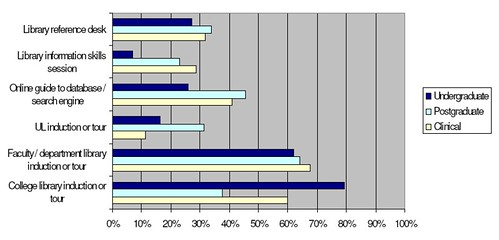* Of the 1771 respondents, 57.5% were from undergraduates (n=1019), 34.1% from postgraduates (n=604) and 8.4% from clinical students (n=148). From the undergraduate survey population, 34.5% were first year students (n=352), 33.5% were second year students (n=341), 26.6% were in the third year of their course (n=271), and 5.4% were in their fourth year or more
So where do these students get their references from? [1005 responses]

Predominantly set material in first and second years, but then reference chasing kicks in as they progress through their student career.
On the usage of 'general' electronic resources, 860 undergrds, 488 postgrads and 140 clinical students responded as follows:

In free response, JSTOR was also mentioned as a useful resource by a significant percentage of students.
When trying to understand the motivation or expectation of searchers when looking for information, relevance and speed are key:

The 'higher level' factors - being able to cite a reference or rediscover a resource, are most keenly felt in the third year, presumably a time when individual research projects are being assessed.

So when it comers to seeking help for finding or sharing information, where is the first point of call? The Library?

Err, no! (Looooo-zerrrrr... #fail).
In terms of making use of Library induction offerings, the 796 responses were dominated by induction tours, rather than info skills sessions or online guides.

Finally, 60 Library respondents reported on how Library induction/training matters were communicated to users:

It is not reported how effective those communication channels were either felt to be important, or actually were...



1 comment:
How interesting that 78% use Google for research and more than 90% report they want to retrieve relevant results.
Post a Comment